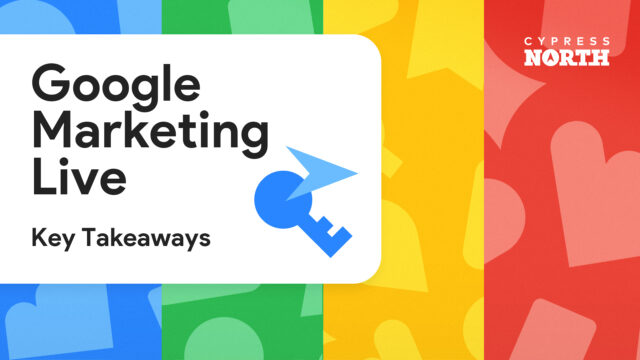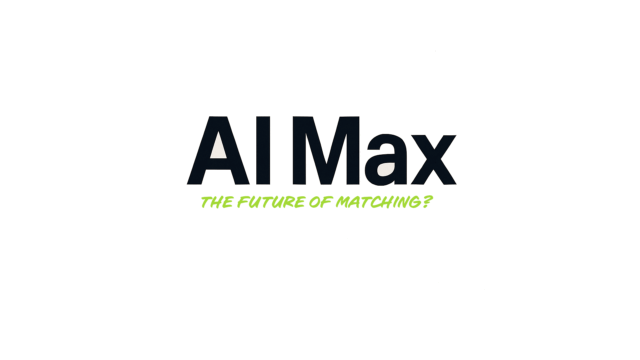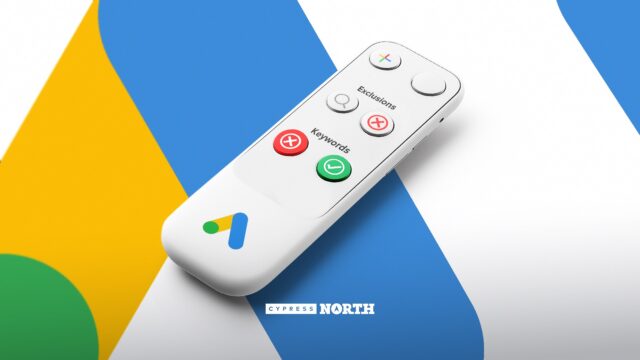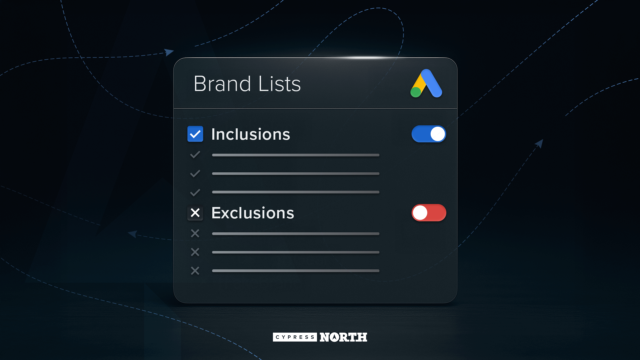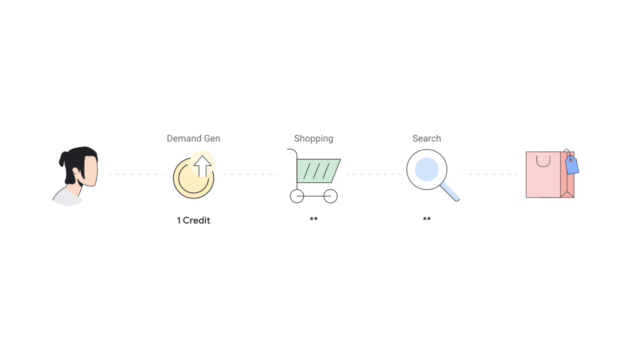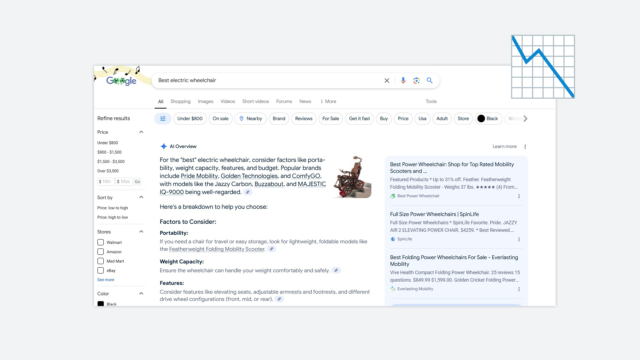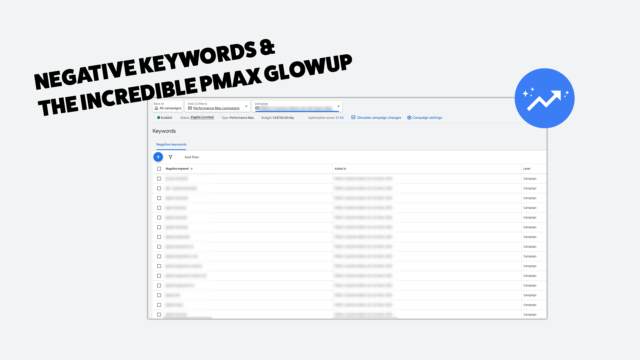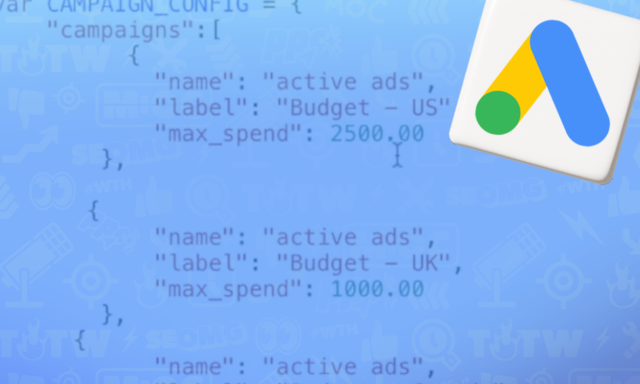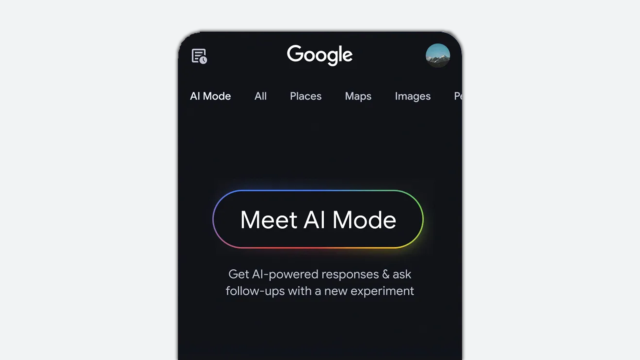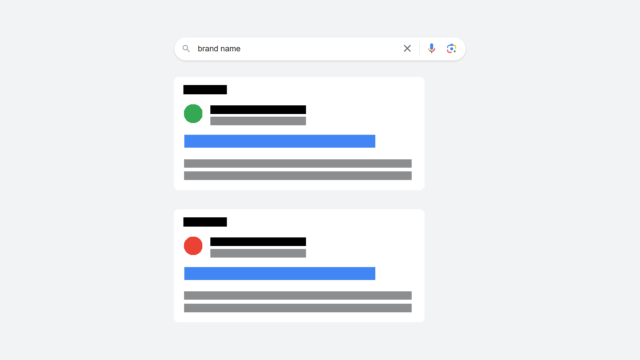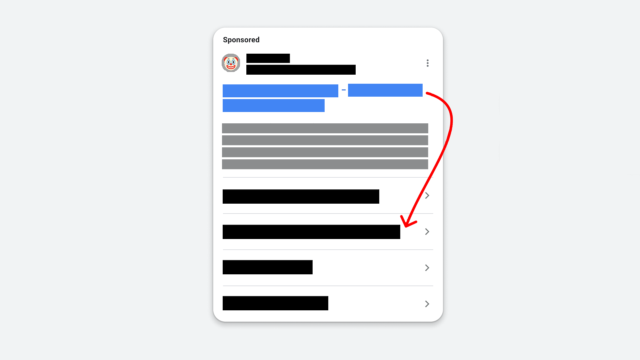B2B Marketing With the Rise of Gen Z: Navigating the Digital Native Workforce

These tech-savvy digital natives may have a short attention span, but you might be able to use that to your advantage
Much of marketing revolves around staying ahead of trends, your competition, and understanding your customer base. With the rise of Generation Z in the workforce, B2B marketers are in the perfect position to conduct market research on this demographic to understand an emerging customer base. This will help them find areas where they can tailor their marketing tactics to meet the unique needs and preferences of this digitally native and socially conscious generation.

In this post, we’ll explore who Generation Z is and identify some best practices when it comes to B2B marketing to Gen Z.
Cracking the Code: Understanding Gen Z and the Digital Native Difference
Understanding Gen Z and the Digital Native
Generation Z, born between 1997 and 2012, was brought up during the rise of the internet, signaled by the dot-com bubble in 1995. While this bubble burst, the internet and technological advancements continued to develop.
You may be familiar with the term “iPad kids,” which describes younger children who primarily consume content from their tablets. This concept aligns with the broader category of digital natives, encompassing individuals who have spent their formative years in a digital-centric environment heavily shaped by technology, including the internet and various digital devices. This notion of digital natives, which Gen Z largely embodies, underscores the profound impact of the digital age on their lives and preferences.
Having been exposed to technology from an early age, Gen Zers tend to have an intuitive understanding of how to navigate the digital landscape. The way this generation consumes information, communicates, learns, and interacts is impacted by their comfort and fluency with technology.

With smartphones being a second skin, Gen Z constantly has access to information almost immediately. Nothing is ever lost on the digital generation.
When members of Generation Z were born, they received two things: An innate understanding of how to use internet-related technologies and a heightened awareness of pressing social issues.
As a result, Gen Z places a significant emphasis on supporting brands that prioritize social justice issues and Diversity, Equity, and Inclusion (DEI) initiatives. Albeit, it is not enough to just release a campaign around a particular issue in hopes of garnering the support of this generation; Gen Z sees beyond mere corporate gestures and prides themselves on valuing authenticity and intent.

The Evolving Workforce: Who Comprises It Now and in the Future?
The landscape of the American workforce is undergoing a significant transformation, largely driven by the entrance of Generation Z. As we look toward 2030, projections suggest that Generation Z will constitute approximately 30% of the workforce. This shift signifies a generational change in the labor force, bringing with it fresh ideas, innovative approaches to work, and an innate fluency with technology.
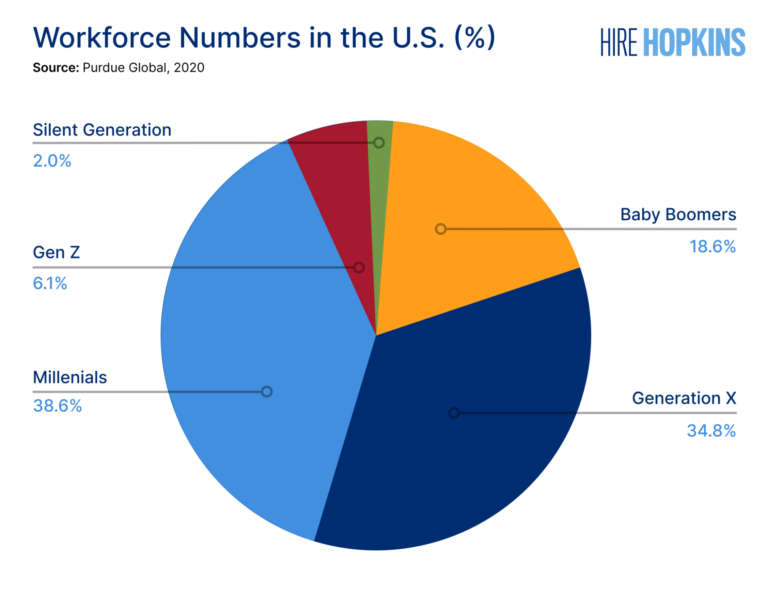
Chart From Johns Hopkins University
While it's important to note that Gen Z is still a relatively young demographic, a considerable number of them have already graduated from college and are making their debut in the professional world.
Moreover, their purchasing power continues to grow, even in the face of economic fluctuations. In a 2021 report, Bloomberg noted that these digital natives had accumulated around $360 billion in disposable income, prompting businesses to figure out ways to get them to spend.
As Gen Z grows into the workforce, they may hold more entry-level positions, limiting their direct purchasing power. However, Gen Z’s influence transcends their immediate roles. This generation possesses the potential to shape purchasing behaviors, workplace cultures, and social causes not only for themselves but also for older generations.
The first step in marketing toward Gen Z is recognizing that their influence extends far beyond their own financial decisions.
The Digital Native Difference: Gen Z's Unique Internet Usage Patterns
Gen Z, the first generation with constant internet access and digital connectivity from birth, perceives the physical and digital realms as a seamless blend of experiences. This generation's online habits are truly distinctive.
Gen Z averages 9 hours of screen time a day, spending roughly 7.2 hours of those hours consuming video content. Their media consumption journey begins with casual scrolling through platforms like TikTok and Instagram Reels in the morning, transitions to YouTube during lunch, and culminates with Netflix or Hulu in the evening for the latest comedy or drama. Much of Gen Z's screen time is dedicated to user-generated content, showcasing their preference for authenticity and relatable content.
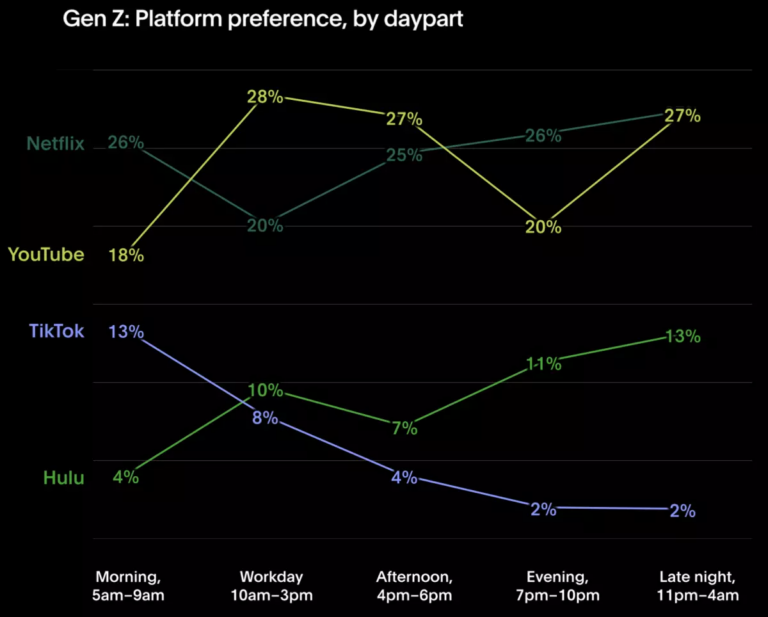
Timeline From LA Times
A significant 92% of Gen Z individuals are known to multitask while surfing the internet, a behavior that surpasses any other generation. Common multitasking activities include eating (59%), listening to music (also 59%), and talking on the phone (45%).
For marketers, it's crucial to acknowledge that when engaging with Gen Z, there's a high likelihood of partial distraction. Consequently, it's advisable to prioritize user-friendly design, featuring prominently sized headings, easily scannable pages, and a direct and succinct approach to content delivery to effectively capture their attention.
TL;DR? You’ve Got Gen Z Brain!
Gen Z's digital habits reveal a generation deeply immersed in online content, with a strong preference for authenticity and user-generated material. Their multitasking skills emphasize the need for concise, attention-grabbing content to engage effectively.
Their distinctive traits, preferences, and values require a tailored approach, making it imperative for marketers to adapt and evolve their strategies to effectively reach and resonate with this emerging generation of professionals.
In harnessing the potential of Gen Z, we embark on a journey of innovation and transformation that will shape the future of the workforce and the world of B2B marketing.
How B2B Marketers Can Reach Gen Z
Are you still following along?
Having identified who Gen Z is, what their priorities are, and their future in the workforce, understanding how to reach them in the B2B marketing space becomes clearer. Marketers must embrace their tech-savvy, socially conscious, and digitally connected nature, aligning strategies with their unique preferences for authentic and value-driven content.
Brand Positioning: Trust, Authenticity, and Personalization
Trust serves as the solid foundation upon which effective brand positioning thrives in the age of Gen Z. According to the Edelman Trust Barometer, 59% of Gen Z individuals are willing to stop buying from a brand if they don't trust the company behind it.
This trust factor carries substantial weight, particularly when considering the influence Gen Z wields - not just over their own choices but also over the decisions of older generations. Gaining the trust of Gen Z can have a cascading effect on the broader consumer landscape.

Data From Edelman
What sets Gen Z apart is their penchant for aligning their purchases with their beliefs, with a significant 73% making buying decisions based on their values. This inclination toward values-driven consumption opens the door for brands to tap into influencer marketing as a means of fostering authenticity and building trust.
Gen Z is more likely to respond positively to marketing that features real customers representing diverse audiences and content that's realistic rather than overly polished. However, it's crucial to acknowledge that trust in companies, in general, is a delicate matter.
Only 42% of Gen Z express trust in corporations, according to Insider Intelligence. Additionally, only 53% of Gen Z individuals perceive brands as authentic, contrasting with the 61% of millennials who share this view.
In this landscape, brands must navigate with authenticity, trustworthiness, and personalization at the forefront of their positioning strategies to resonate genuinely with the discerning Gen Z audience.
Leveraging Social Media for Gen Z Engagement
Gen Zers exhibit a strong and continuous presence on their smartphones, frequently engaging with various social media platforms throughout the day. These platforms have become essential not only for personal connections but also as powerful tools for brand research before making purchasing decisions.
Notably, 40% of Gen Z use TikTok search as opposed to Google. Google executives have pointed out that platforms like Instagram and TikTok are increasingly competing with some of Google's core products, Search and Maps, emphasizing the role of visual content in attracting Gen Z's attention.
Gen Z's preferences are distinctly visual and concise. They prefer information that’s easily digestible, as evident in their substantial use of TikTok's search function, which highlights the importance of visual assets.
A significant 97% of Gen Z individuals surveyed cite social media as their top method for researching shopping options, highlighting the impact that social media plays in influencing their purchase decisions. It's worth noting the rapid increase in smartphone accessibility among American teens, with 95% having access to one, compared to 73% in 2014.
Though still young, as these cohorts step into the professional world in the coming years, the shift in smartphone accessibility highlights the critical need for B2B marketing strategies to prioritize a mobile-first, visually captivating approach when targeting these on-the-go consumers.
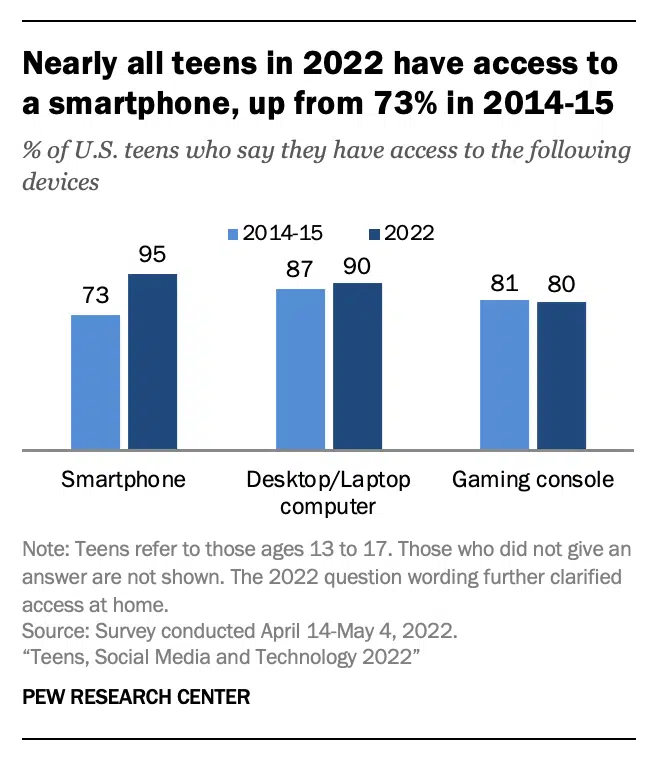
Graph From Pew Research Center
Keep it Shorts: Easy to Consume Content & Visual Assets
In the era of Gen Z, capturing their attention and engagement hinges on a preference for easy-to-consume material and visual assets. This generation, known for its mobile-first approach, has a strong hunger for video content, with platforms like Snapchat, TikTok, and Instagram leading the charge in promoting short videos. With a substantial portion of TikTok's user base (47.4%) falling under the age of 29, it effectively reaches both Gen Z and younger millennials.
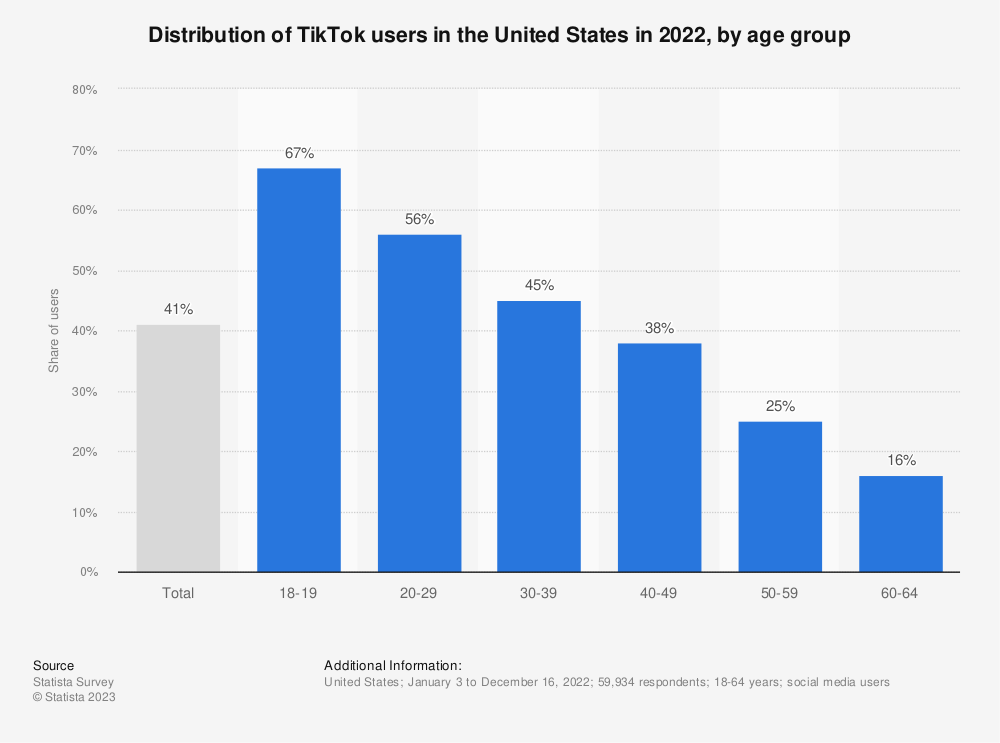
Graph From Statista
What stands out is Gen Z's preference for short-form content, with 61% favoring short videos under one minute in length. The impact of video is undeniable, as evidenced by the fact that 70% of viewers have made purchases from brands after encountering content on YouTube. Moreover, a significant percentage of individuals across generations, including 56% of Gen Z, 54% of Millennials, 48% of Gen X, and 26% of Boomers, cite YouTube as their primary platform for discovering new products.
For B2B marketers, adapting to Gen Z's digital habits is both a challenge and an opportunity. It necessitates a reevaluation of traditional social media strategies that rely heavily on platforms like Facebook and a shift toward engaging with Gen Z on the platforms they engage with the most.
Understanding the distinct characteristics and user behaviors of each platform empowers B2B marketers to create tailored, compelling content that resonates deeply with this influential generation. Ultimately, the key lies in leveraging the power of visual content to build authentic connections with this tech-savvy audience, positioning B2B companies for success in the modern digital landscape.
TL;DR? Actionable Insights B2B Marketers Can Use to Target Gen Z
Build Trust and Authenticity: Trust is paramount for Gen Z. Invest in building trust through authentic brand positioning. Consider influencer marketing as a means of fostering authenticity and trust. Gen Z is more likely to respond positively to real B2B customers representing diverse audiences.
Leverage Social Media: Gen Z's strong presence on social media platforms, coupled with their reliance on smartphones, underscores the importance of social media marketing. Focus on concise, visually appealing content that caters to their preferences. Recognize that social media plays a significant role in influencing their purchasing decisions.
Keep it Shorts: Platforms like TikTok and YouTube are particularly effective for reaching this audience. Use video content, especially short videos, to convey your message effectively.
Engage Gen Z Marketers: To navigate the ever-changing digital landscape, consider employing Gen Z marketers. Their innate understanding of digital technologies and emerging trends can provide invaluable insights. Gen Z marketers can help businesses stay relevant and competitive in a world where disruption is the norm.
See below for more info on hiring Gen Z marketers
“It Seems Like Nobody Wants To Work These Days”: Employing Gen Z Marketers
No one knows the Gen Z landscape better than Gen Zers themselves. In an era where “unprecedented times” appear to be the norm, the insights and perspectives of Gen Z become invaluable in navigating the evolving professional landscape.
With their innate understanding of digital technologies and the online world, Gen Z marketers bring a fresh and dynamic approach to the table.
Their ability to decipher the intricacies of social media platforms, create authentic content, and tap into emerging trends positions them as a valuable asset in today's constantly changing marketing landscape.
As the workforce undergoes a transformation, harnessing the unique skills and perspectives of Gen Z employees not only caters to their preferences but also equips businesses with a competitive edge in staying relevant in a world where disruption is the thread tying generations together.
To truly understand what Gen Z seeks from businesses, the most effective approach is to directly engage with them.
Embrace a New Frontier for B2B Marketing, Generation Z is Here
In the ever-evolving world of business, adaptation is key to survival and success. Generation Z, with their digital native prowess, strong social consciousness, and unique perspectives, represents a new frontier for B2B marketing.
As this generation continues to rise in the workforce, they bring with them a wave of change, challenging traditional marketing paradigms and opening doors to innovative strategies.
To thrive in this era of disruption, businesses must not only acknowledge the influence of Gen Z but actively engage with their values, preferences, and authentic voices.
It's not merely about marketing to Gen Z but co-creating with them, forging meaningful connections, and leveraging their insights to shape the future of B2B marketing.
We are the iPad kids, and we are here.
Need tips & tricks for Gen Z marketing strategies? Just reach out to your friendly, neighborhood Gen Z marketer!
Meet the Author

Jasminstar Lysaith
Jasminstar is a Digital Marketing Strategist who joined our Cypress North Rochester office in March 2023.
Since joining us, Jasminstar has become Google Ads certified in search, display, shopping, and video ads. Some of their daily responsibilities include campaign maintenance, building out blog posts, and working on site plans and audits, all while bringing joy and laughter to the Roc office and team Slack channel. Jasminstar also works with the data analytics team and has been learning how to pull and visualize data as a way to bridge the gap between the data and digital marketing teams.
Jasminstar grew up in New York City and earned a bachelor’s degree in economics from Columbia University before moving to Rochester. Before joining Cypress North, they were a Digital Marketing Intern at Colgate-Palmolive.
Outside of work, Jasminstar enjoys going to art exhibits to support friends and, in the same breath, buying art and making glass cups out of old bottles. They also like going for walks around the neighborhood, and hiking when possible. Jasminstar loves their nephew, playing Sudoku, reading, and making natural juices.
Jasminstar speaks a little German and used to live in Jamaica, where most of their family still resides. While living in NYC, Jasminstar used to bartend, and once met Rihanna in a shoe store.


